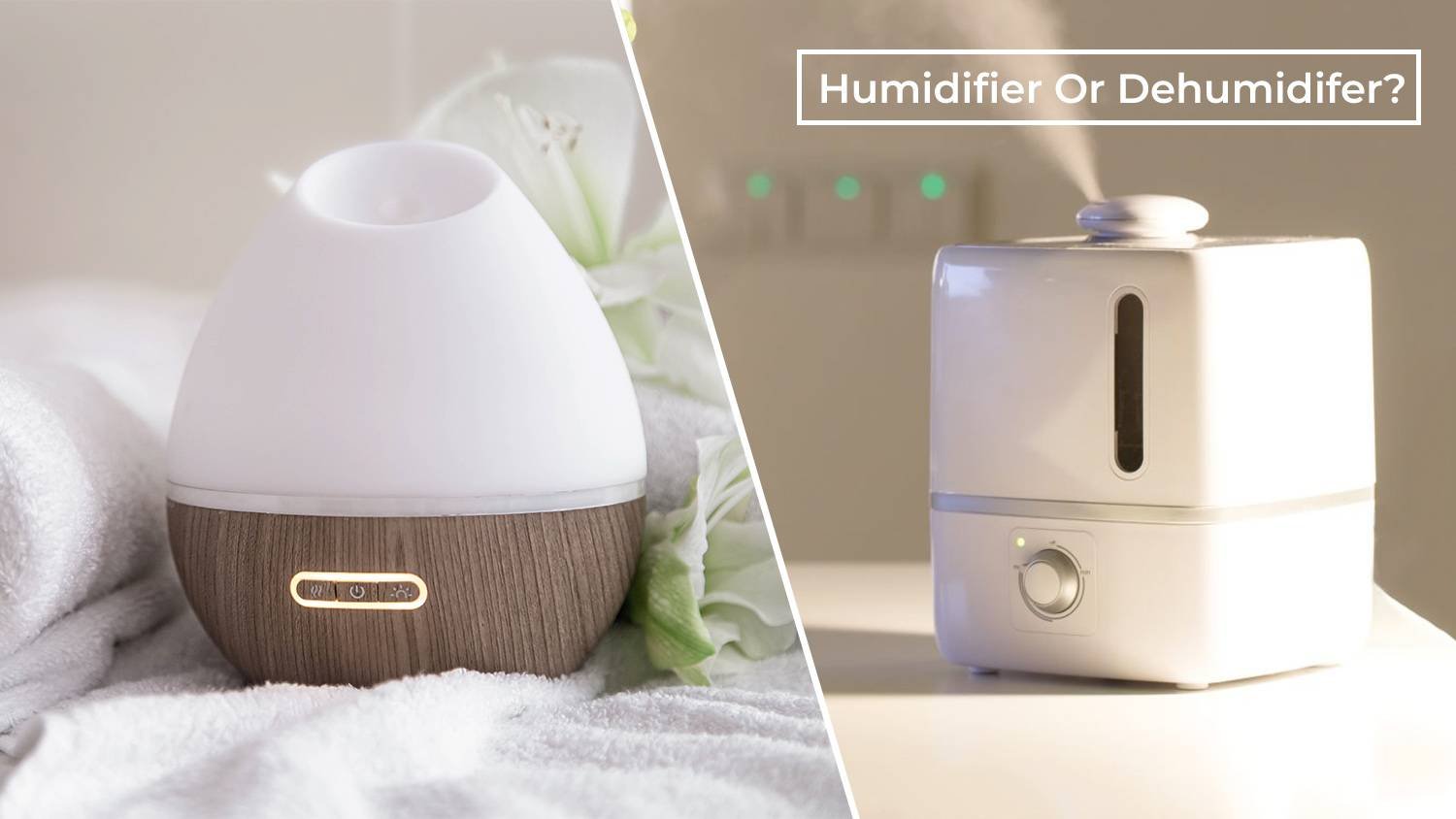Appliances like dehumidifiers and humidifiers are made to control the amount of moisture in interior spaces. Even though they have different functions, they are necessary to keep homes and workplaces cosy and hygienic.
What is a Humidifier?
By adding moisture to the air, humidifiers raise humidity levels to the ideal level for comfort. Various humidifiers, such as steam vaporizers, evaporative, and ultrasonic humidifiers, are available.
Types of Humidifiers
Evaporative Humidifiers
Ultrasonic Humidifiers
Steam Vaporizers
How Humidifiers Work
Humidifiers release water vapour into the atmosphere or use steam or ultrasonic vibrations to create a fine mist.
What is a Dehumidifier?
Dehumidifiers draw extra moisture out of the air to lower humidity levels. They work exceptionally well in moist areas where mildew and mould might thrive.
Types of Dehumidifiers
Refrigerative Dehumidifiers
Desiccant Dehumidifiers
How Dehumidifiers Work
Dehumidifiers successfully lower humidity levels by removing moisture from the air through either refrigeration or desiccant technology.
The Advantages of Humidifier Use: Better Indoor Air Quality
In addition to improving general respiratory health, humidifiers help reduce symptoms of dry air, such as sore throats, irritated eyes, and dry skin.
Relieves Respiratory Issues
Relieving the symptoms of respiratory disorders like allergies and asthma can be accomplished by keeping humidity levels at ideal levels.
Protects Wooden Furniture and Flooring
Humidifiers can help maintain hardwood furniture and floors by eliminating excessive dryness, which lowers the chance of warping or breaking.
Benefits of Using a Dehumidifier
Stops the Growth of Mold and Mildew
Dehumidifiers help prevent mould growth, mildew, and other dangerous germs by efficiently regulating moisture levels.
Reduces Allergens
Dehumidifiers can improve indoor air quality by reducing the amount of dust mites and allergens in the air by maintaining lower humidity levels.
Helps with Pest Control
The likelihood of an infestation is decreased because dehumidifiers produce drier conditions that are less inviting to pests like dust mites and cockroaches.
Factors to Consider When Choosing Between a Humidifier and Dehumidifier
Weather and Climate
When deciding whether to add or remove moisture from the air, consider the local weather patterns and climate.
Indoor Air Quality
Evaluate the indoor air quality of your house or business, considering elements like humidity, ventilation, and allergens.
Health Considerations
Consider any allergies or respiratory disorders that could be made worse by dry or humid air.
Home Structure and Materials
Think about the materials that were used to build and furnish your home. Some materials can be more prone to harm from extreme dampness or dryness.
Costs Associated with Humidifiers vs. Dehumidifiers
Original Expense
The price of humidifiers and dehumidifiers varies based on features, size, and brand. Dehumidifiers are more expensive upfront.
Operating Costs
Consider the energy usage and continuous maintenance expenses of running a dehumidifier or humidifier.
Maintenance Costs
Include in your budget the price of any necessary maintenance for your selected appliance and new filters and cleaning supplies.
Maintenance and Care Tips for Humidifiers and Dehumidifiers
Cleaning
Regularly clean and disinfect your humidifier or dehumidifier to prevent mould, mildew, and bacteria buildup.
Source of Water
For best results and to reduce mineral buildup, use distilled or filtered water.
Filter Replacement
Replace filters and other components according to the manufacturer’s instructions to preserve efficacy and efficiency.
Regular Inspections
Check your appliance from time to time for any indications of damage or malfunction, and fix problems right away to stop more damage.
Common Misconceptions about Humidifiers and Dehumidifiers
Myth: Only dry climates need humidifiers
Humidifiers are frequently used to provide moisture to the air in dry locations, but they can also be helpful in more humid environments to relieve some health problems.
Myth: Only humid climates may use dehumidifiers
Regardless of the current climate, dehumidifiers are helpful in any situation with excess moisture.
Myth: Only health problems require the use of humidifiers and dehumidifiers
Humidifiers and dehumidifiers are essential for protecting building materials and averting property damage, even though they can significantly impact health.
Conclusion
A humidifier or dehumidifier should be chosen based on several parameters, such as climate, indoor air quality, and individual health concerns. You can choose an appliance wisely to create a cosy and healthful interior by being aware of the advantages, expenses, and upkeep needs of each one.
FAQs
Do humidifiers consume a lot of electricity?
The energy consumption of humidifiers varies based on their size and type. On the other hand, modern models are made to use less energy.
Can I use a humidifier and dehumidifier in the same room?
It is not advised to use both appliances in the same room simultaneously since they conflict and may cause uneven humidity levels.
How often should I clean my humidifier or dehumidifier?
To avoid mould, bacteria, and mineral accumulation, it is best to clean your appliance regularly, according to the manufacturer’s instructions.
Can a humidifier or dehumidifier help with seasonal allergies?
Yes, by keeping humidity levels at their ideal levels, you can lessen the symptoms of seasonal allergies by keeping dust mites and pollen at bay.
Are there any safety precautions I should take when using a humidifier or dehumidifier?
Ensure your appliance is positioned correctly, away from water sources and electrical outlets, and always adhere to the manufacturer’s instructions for safe use and upkeep.
